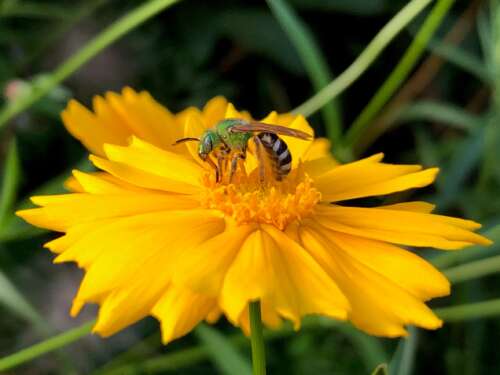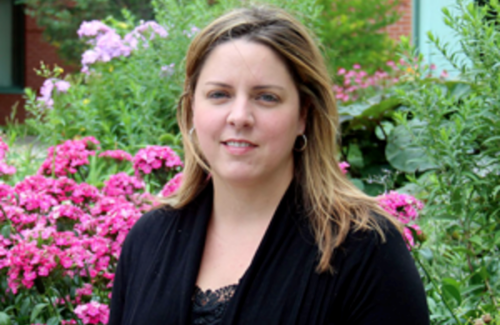 Amid discussions about provincial greenbelt lands, a pioneering study by University of Guelph and Cape Breton University scientists says recommendations for wild bee habitats fall short of what these critical food crop pollinators need.
Amid discussions about provincial greenbelt lands, a pioneering study by University of Guelph and Cape Breton University scientists says recommendations for wild bee habitats fall short of what these critical food crop pollinators need.
The amount of land needed to support wild bees is up to three and a half times greater than is currently recommended, according to U of G’s Dr. Nigel Raine, Rebanks Family Chair in Pollinator Conservation in the Ontario Agricultural College‘s School of Environmental Sciences, and CBU’s Dr. Alana Pindar, Weston Family Visiting Professor of Ecosystem Health and Food Security.
A range of habitat types needed for wild bees
Their study, published in Scientific Reports, is the first to quantify how much land is required to maintain communities of wild native bees in Canada. “Our results show that safeguarding healthy wild bee communities requires 11.6 to 16.7 per cent land cover from a range of habitat types in a landscape,” said Pindar.

“This is irrespective of whether maintaining species richness or abundance are stated conservation goals.”
That range is 2.6 to 3.7 times greater than the 2.5-per-cent land cover recommendations currently proposed. “Any conservation policy falling short of these targets will severely impact bee biodiversity,” said Pindar.
Earlier studies strongly suggest that insect pollinators are in widespread decline around the world, threatening global food production and security as well as communities of flowering plants.
For the study, Raine and Pindar combined extensive collection records of Canadian wild bees with high-resolution habitat maps to determine how much land these pollinating insects require.
Conserving pollinator habitat ultimately impacts food security

“To conserve wild bees, and the pollination services they provide to us, we need to know the extent of the habitat required to sustain the species,” said Raine. “Despite the importance of these questions, the answers were previously unknown.”
The team’s results provide clear and targeted recommendations for action to conserve these essential pollinators. Failing to meet these targets will worsen the global biodiversity crisis, said Raine.
“One in every three bites of food we take is the direct result of pollinators,” said Raine. “Conserving insufficient habitat will directly impact pollination services and, ultimately, food security on a national and international scale.”
This work was funded by the Natural Sciences and Engineering Research Council of Canada, the Ontario Agri-Food Innovation Alliance (a collaboration between the Ontario Ministry of Agriculture, Food and Rural Affairs and the University of Guelph), the Food from Thought program, and the Weston Family Foundation.
Contact:
Dr. Nigel Raine
nraine@uoguelph.ca
Dr. Alana Pindar
alana_pindar@cbu.ca
